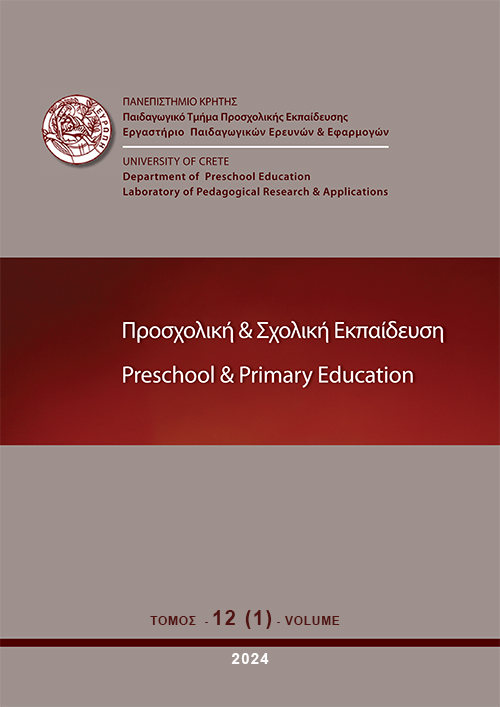Η επίδραση των γονικών πρακτικών στη συμπεριφορά παιδιών προσχολικής ηλικίας, από την οπτική των γονέων
Abstract
Ο τρόπος ανατροφής επιδρά στην ψυχοκοινωνική ανάπτυξη των παιδιών, στην καλλιέργεια φιλοκοινωνικής συμπεριφοράς και στην προσαρμογή τους στο ευρύτερο κοινωνικό περιβάλλον. Η παρούσα έρευνα είχε ως σκοπό τη διερεύνηση των επιδράσεων του γονικού τρόπου διαπαιδαγώγησης στην εκδήλωση δυσπροσαρμοστικών και φιλοκοινωνικών συμπεριφορών παιδιών προσχολικής ηλικίας. Στην έρευνα συμμετείχαν 215 γονείς (134 εξ αυτών ζευγάρια, στη συντριπτική τους πλειοψηφία 31-50 ετών) παιδιών ηλικίας 4-6 ετών και για τη συλλογή των δεδομένων αξιοποιήθηκε ηλεκτρονικό ερωτηματολόγιο (Ερωτηματολόγιο Τύπων Γονέων και Ερωτηματολόγιο Δυνατοτήτων και Δυσκολιών). Τα αποτελέσματα κατέδειξαν στατιστικά σημαντικές διαφορές μεταξύ μητέρων και πατέρων μόνο ως προς τον υποστηρικτικό γονικό τύπο. Επιπλέον, αναδείχθηκε ότι ο υποστηρικτικός τρόπος ανατροφής συνδέεται κυρίως με την επίδειξη φιλοκοινωνικής συμπεριφοράς, ενώ ο αυταρχικός και ο ανεκτικός με εξωτερικευμένα προβλήματα (υπερκινητικότητα ή/και διάσπαση προσοχής, προβλήματα συμπεριφοράς), με ορισμένες διαφοροποιήσεις ανάλογα με το φύλο του γονιού. Συνολικά, τα αποτελέσματα της παρούσας έρευνας δείχνουν ότι για την αποτελεσματική ανατροφή και την πρόληψη εξωτερικευμένων και εσωτερικευμένων προβλημάτων στα παιδιά, η χρήση υποστηρικτικών τρόπων τόσο από τις μητέρες όσο και από τους πατέρες μπορεί να διαδραματίσει καθοριστικό ρόλο.
Article Details
- Zitationsvorschlag
-
Ευθυμιάδου Ό., & Αντωνιάδου Ν. (2024). Η επίδραση των γονικών πρακτικών στη συμπεριφορά παιδιών προσχολικής ηλικίας, από την οπτική των γονέων. Preschool and Primary Education, 12(1), 21–37. https://doi.org/10.12681/ppej.34186
- Ausgabe
- Bd. 12 Nr. 1 (2024): Μάιος 2024
- Rubrik
- Άρθρα

Dieses Werk steht unter der Lizenz Creative Commons Namensnennung - Nicht-kommerziell - Weitergabe unter gleichen Bedingungen 4.0 International.
Οι συγγραφείς των άρθρων που δημοσιεύονται στο ΠΡΟΣΧΟΛΙΚΗ & ΣΧΟΛΙΚΗ ΕΚΠΑΙΔΕΥΣΗ διατηρούν τα δικαιώματα πνευματικής ιδιοκτησίας επί των άρθρων τους, δίνοντας στο περιοδικό το δικαίωμα της πρώτης δημοσίευσης. Άρθρα που δημοσιεύονται στο ΠΡΟΣΧΟΛΙΚΗ & ΣΧΟΛΙΚΗ ΕΚΠΑΙΔΕΥΣΗ διατίθενται με άδεια Creative Commons 3.0 και σύμφωνα με την άδεια μπορούν να χρησιμοποιούνται ελεύθερα, με αναφορά στο/στη συγγραφέα και στην πρώτη δημοσίευση για μη κερδοσκοπικούς σκοπούς και με δικαίωμα τροποποίησης μόνον με παρόμοια διανομή (αν αναμείξετε, τροποποιήσετε, ή δημιουργήσετε πάνω στο υλικό, πρέπει να διανείμετε τις δικές σας συνεισφορές υπό την ίδια άδεια όπως και το πρωτότυπο). To Εργαστήριο Παιδαγωγικών Ερευνών και Εφαρμογών του Παιδαγωγικού Τμήματος Προσχολικής Εκπαίδευσης του Πανεπιστημίου Κρήτης και το Εθνικό Κέντρο Τεκμηρίωσης διατηρούν το δικαίωμα να δημοσιεύουν, να αναπαραγάγουν, να παρουσιάζουν στο κοινό, να διανέμουν και χρησιμοποιούν άρθρα που δημοσιεύονται στο ΠΡΟΣΧΟΛΙΚΗ & ΣΧΟΛΙΚΗ ΕΚΠΑΙΔΕΥΣΗ σε οποιοδήποτε μέσο και μορφή είτε μεμονωμένα είτε ως μέρη συλλογικών έργων, για όλο το χρόνο διάρκειας προστασίας της πνευματικής ιδιοκτησίας και για όλες τις χώρες του κόσμου. Αυτό περιλαμβάνει ενδεικτικά και όχι αποκλειστικά, το δικαίωμα δημοσίευσης των άρθρων σε τεύχη του περιοδικού ΠΡΟΣΧΟΛΙΚΗ & ΣΧΟΛΙΚΗ ΕΚΠΑΙΔΕΥΣΗ, αναπαραγωγής και διανομής μεμονωμένων αντιγράφων των άρθρων, αναπαραγωγής ολόκληρων των άρθρων σε άλλη έκδοση του Εργαστηρίου Παιδαγωγικών Ερευνών και Εφαρμογών του Παιδαγωγικού Τμήματος Προσχολικής Εκπαίδευσης του Πανεπιστημίου Κρήτης και του Εθνικού Κέντρου Τεκμηρίωσης και αναπαραγωγής και διανομής των άρθρων ή περίληψης αυτών με χρήση πληροφορικού συστήματος αποθετηρίου.



